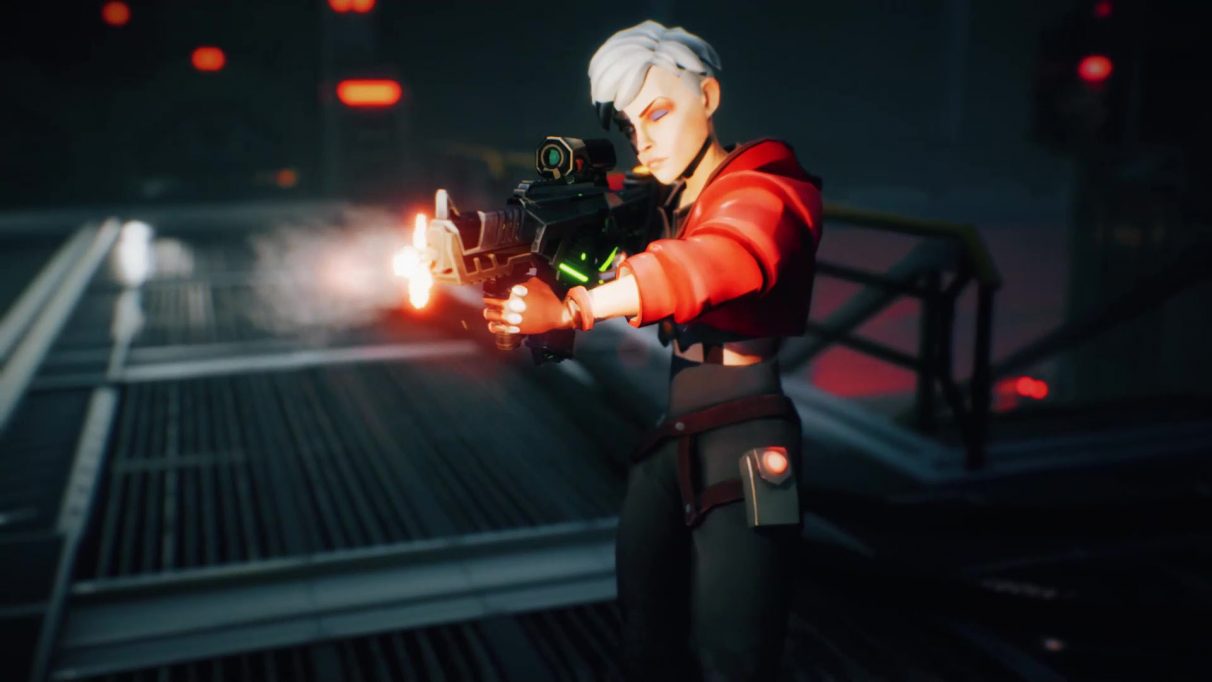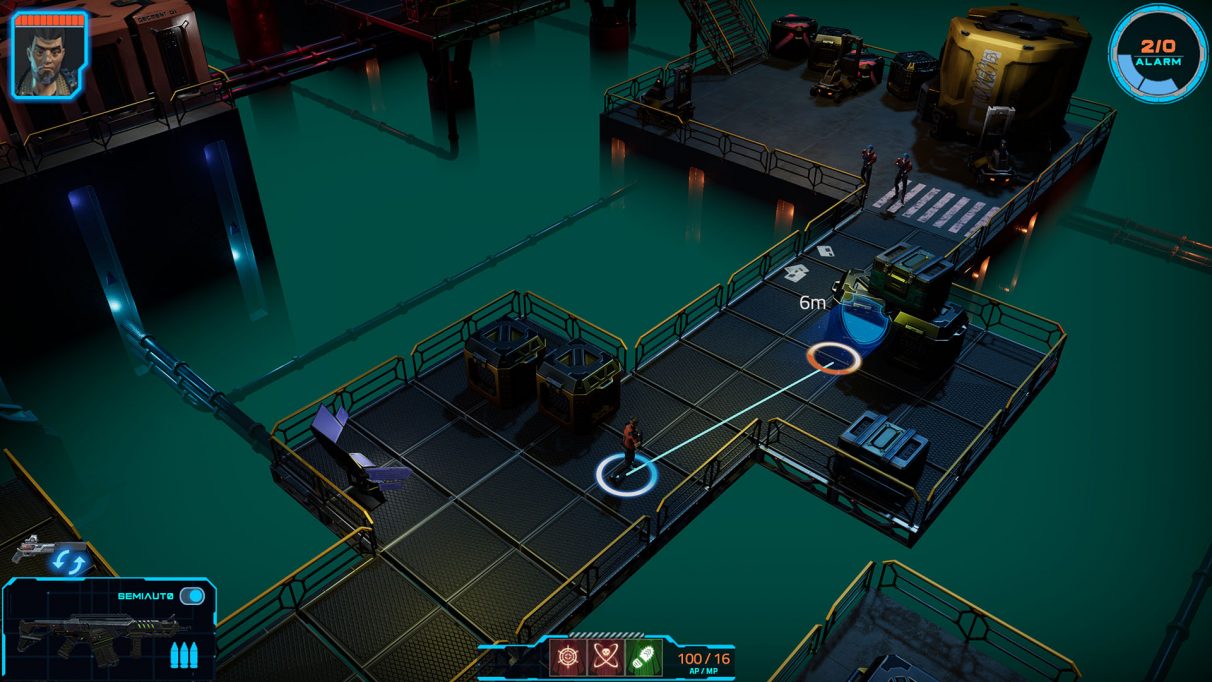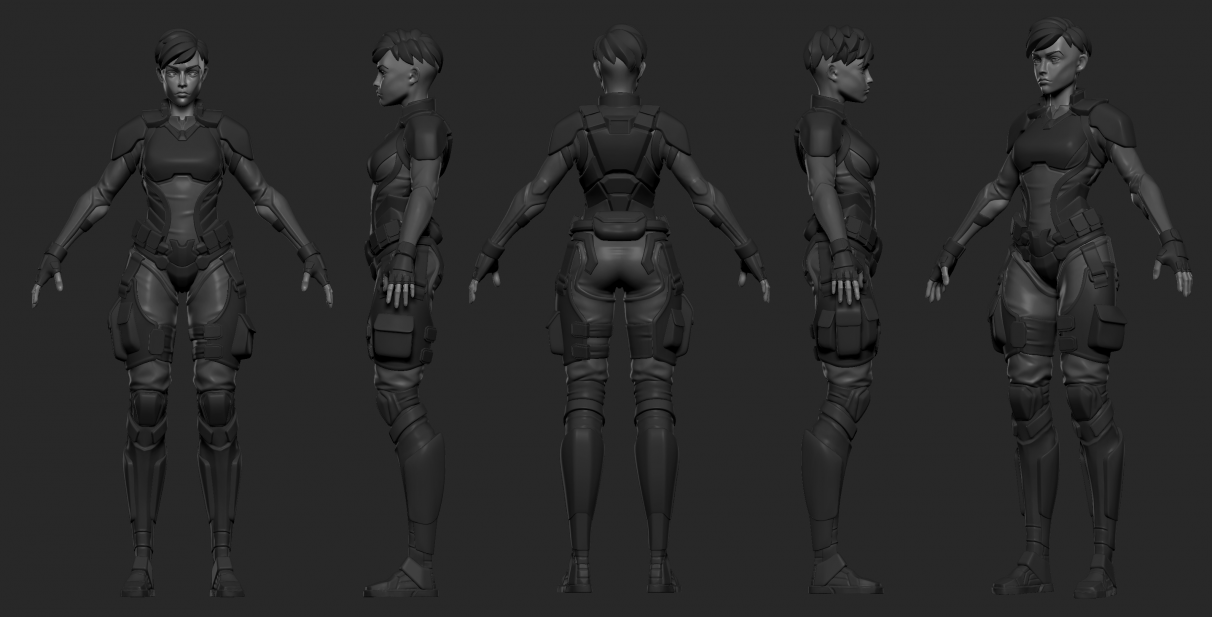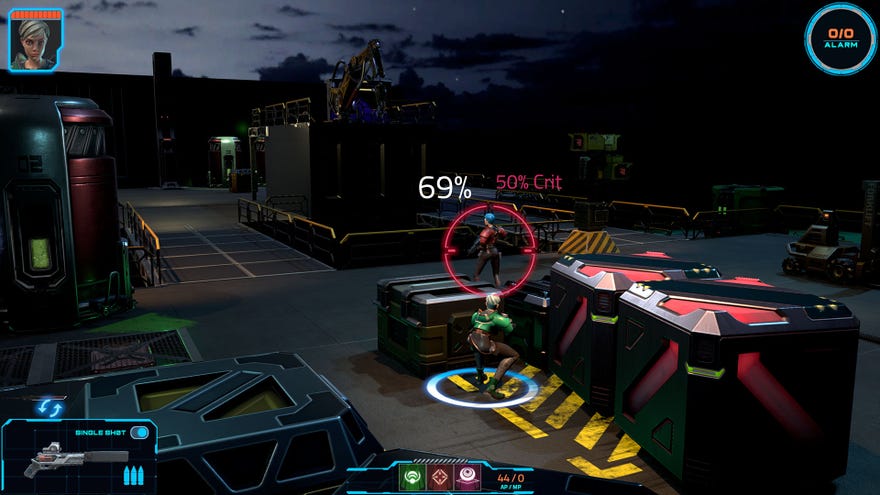The Trese Brothers dish details on Cyber Knights: Flashpoint, their new cyberpunk RPG
Knights who say "ni.exe"
It's no secret that I adore Star Traders: Frontiers, the space captain RPG. It was my favourite game of 2018 and one of the best of the decade, and still threatens to consume my weekends whenever I carelessly click on its icon.
Its creators, the Trese Brothers (it's pronounced "Trese"), have just successfully funded their new game, Cyber Knights: Flashpoint on Kickstarter. They met their goal in under 12 hours. Like Frontiers, which was also partly crowdfunded, it's an original RPG set in the same world as one of their earlier mobile games, but ramping up the scope, ambition, and production values. I took the opportunity to corner them with some questions about their studio and their plans for the new game.
The Treseses have been making games for close to a decade, initially working on mobile RPGs like Templar Assault and Age of Pirates before spreading to PC. "Cyber Knights: Flashpoint is a game we’ve been dreaming about for years. To use as few words as possible, it is a new cyberpunk RPG with some XCOM elements," says Cory Trese. "Our aim is for Flashpoint to be a major step up in terms of scope and graphics compared to Star Traders: Frontiers. Over the past year we’ve expanded our team and retooled our studio’s workflow around this new engine."
"It’s also our first 3D game, so my job as art director feels completely different. We’ve been preparing for this step up to 3D for years, but to finally make the leap still seems like a dream," Andrew Trese adds. It is indeed a big step.

It's clear even from this very early stage that Cyber Knights: Flashpoint will present a new technical challenge, not just by moving to 3D, but also by abandoning tile-based movement and combat. That's a particularly interesting choice given the widespread XCOM style "tiles and two actions" standard we see in turn based tactics games, and it suggests a more granular level of detail. "We have a lot of experience building tile-based combat games, like Templar Battleforce where we approximate combat mechanics like grenades into tiles," Andrew explains. "The gridless nature of Cyber Knights lets us implement these combat features in a much more natural fashion." He gives examples: grenade damage decreases depending on the target's distance in metres from the detonation point; targets you can hit with a full auto burst from your weapon are determined by the field of fire angle.
Cory says that the most important thing to them is to balance the simulation elements with "really fun and fluid" combat. "Gridless movement and combat system is going to let us do some really cool stuff," he says. "We’re using an action-point pool system to give the player granular control on the battlefield and a wide range of options including talents, cybernetic abilities and loadout items. While we’re not using hardcore simulation features like exhaustion and bleeding, we do have a detailed cover, recoil and visibility systems."
That's the shooty bits sorted, then. I'm curious what players can expect to get up to in between tactical maps, and when I lazily reference XCOM again, Cory does not complain. "XCOM players will probably feel comfortable in the Safehouse - a multi-room base where team members are completing long-term strategic tasks like crafting, modding weapons or undergoing cybernetic surgery."
They're keen to tie this into the role playing, playing up their plans for a dynamic world beyond the fighting. You play as a Cyber Knight who works for "the most dangerous and unpredictable power-brokers of the New Boston Zone", and they all of these power brokers will have their own agendas in the game’s political simulator. Staying successful will require working a network of fixers, crimelords and megacorp agents, negotiating contracts and getting access to weapons and cyberware to gear up your team. This will be, I am told, a kind of upgraded, expanded version of the Contacts in Star Traders: Frontiers

"Going on a mission isn’t just a click and go," says Andrew. "You’re going to want to gather pre-mission advantages like paying a bribe to a local security officer, forging some fake security passes, buying a stolen passcode from a fixer or having a hacker cook up a custom-made virus for the target’s security network."
One of the strongest elements of Frontiers was its reconciliation of story missions with the degree of freedom you had. Its main plot could go in multiple directions, and you could pursue multiple threads at once. Events would also proceed without you if you failed or ignored jobs, or were too busy meddling in politics to investigate a conspiracy theory. The brothers say that they always try to reuse what worked best from their last game, and this is no exception.
"We’re working to weave together three layers of stories - big city wide events, the stories of your employers and the personal storylines of your team," Andrew explains. "There will be multiple stories going on at the same time, so you’ll have to make choices prioritising which to pursue, delay or straight out ignore." The latter will sound familiar to experienced star traders, but I'm intrigued by the prospect of personal storylines, as well as everything interweaving more - crewmen in Frontiers were colourful, but not all that active.
Cory describes an example. After you accept a job to infiltrate a Crane Technologies lab to steal a drone prototype, a hacker from your team might ask you for a favour. He tells you that his sister was on an indenture to Crane Tech, but she vanished two years ago and the megacorp has maintained a “no comment” stance on her whereabouts. If you agree to help him, your hacker stands to gain a positive loyalty-related Trait. And his story hook will add a secondary objective to hack a personnel system while you’re in the Crane facility and discover her whereabouts. This could then snowball into a revenge or rescue mission, or something more.

The brothers' enthusiasm is obvious, and Cory says that "the opportunity to build connections between these story types is one of the areas that is really exciting."
"Cyberpunk is a live fast and die young setting and we want to embrace that by giving characters a voice and a story from beyond the grave," adds Andrew. "The engine will include narratives based on a character’s death. One example we’ve already written features your deceased friend’s son asking to join the team as a way up and out."
I can't not ask the genre question. Personal bugbear aside, cyberpunk is very much in vogue this year, but what exactly does it mean here? Andrew has an answer ready: "Like a lot of kids in our generation, the bright orange VHS tape of Johnny Mnemonic lead us to Neuromancer, Blade Runner, Shadowrun and more. As we grew up and got into tech ourselves, we always dreamed of making a game that explores themes like transhumanism, dataism, artificial consciousness, corporate warfare and environmental collapse."
"Flashpoint, like many cyberpunk games, gives the player the opportunity to play enhanced transhuman characters with cybernetics that give them superhuman capabilities," says Cory, chiming in. "However, we haven’t shied away from showing the dangers of cyberware - the risks, drawbacks and costs of slicing your way into a cyborg." They both appear keen to make a genre piece, not just an aesthetic, and Andrew says that the game "won’t just mention environmental collapse and corporate warfare in the world-building preamble". They want the game to allow players a real opportunity to dig into the genre.

Looking back through their catalogue, you can see consistent ideas crop up a lot. The Dune-ish space feudalism backdrop of Star Traders: Frontiers is shared with several of their earlier titles, most notably Templar Battleforce, a turn based tactical squad shooter with a zealous space marine feel.
Flashpoint will similarly share a setting with the mobile-exclusive Cyber Knights RPG, but PC players are more likely to be familiar with Star Traders. I asked Cory how they'll compare. "We’re bringing favourite mechanics from Star Traders: Frontiers like the threaded story, evolving characters, Trait mutations and branching missions into Cyber Knights: Flashpoint," he said. "Oh, and save slots. Definitely save slots."
Save games were one of few major complaints when I wrote about Frontiers before its full release. But the pair were willing to compromise on that point, adding several save game systems and optional degrees of permadeath.
This kind of active feedback and interaction with fans is vital to the duo, and they've built an appreciative audience over the years. It's paid off, says Andrew. "If we have a secret it is to invite players behind the scenes and make them part of the process whenever you can," he explains, adding that they owe a "huge debt of gratitude" to their community, many of whom have been following their games for years. "We are proud of our approach and what we’ve been able to accomplish over the decade. It has not been easy and we have been lucky to be in the right place at the right time several times."
It's easy to look at the studio's history and think "this is how game dev should be": starting out with smaller projects to gather an audience, then expanding both it and your ambitions over time. But it rarely works out like that, and even developers who appear to do everything right still struggle to survive. Cory explains that they try to remain focused on building a studio, rather than making just one game. This allows them to look at their smaller projects as all making progress towards the goal. "Another thing that has worked for us is embracing our constraints and trying to turn our limits into advantages," he adds. "With the right perspective, limited resources force you to be creative, to really focus on what matters to your players. We don’t have big AAA budgets and 8K graphics and that just requires us to deliver unique gameplay and top-tier support."
Cory says, though, that it hasn't all been smooth sailing. "Our studio has been through a number of near-death experiences. Patent trolls have threatened us with lawsuits and we’ve survived hackers, thieves, pirates and scammers along the way. There have been multiple times we didn’t have enough money left after paying our bills to pay ourselves."
They both acknowledge their luck, but Andrew points out that sense of perspective helps them a lot: "These types of setbacks are easier to handle when you’re playing the long game and trying to build a studio."
Feedback can be a source of inspiration too, especially for the five Star Traders games Andrew has written. "I’m always finding new angles and inspirations from our alpha players, our Kickstarter creative backers and just our community at large," he says. "It’s especially addictive that the updates keep evolving not only the game’s mechanics but also moving the big galactic story forward in meaningful ways. That just keeps me coming back for more."

Anyone who's kept an eye on Frontiers has likely noted how often and for how long it's been updated. It's already past its 100th update since its release in 2018, many adding or substantially fleshing out content and options, with some adding major plotlines or enhancements to AI and ship combat. Burnout and crunch are still dark stains on the industry, and I'm probably not the first to worry that the Trese Brothers never seem to take a break.
But Cory insists he would probably just spend a holiday playing more Star Traders anyway. "I really love playing space trading games, and I play a lot of Star Traders: Frontiers. I’m honestly really looking forward to playing the heck out of the sequel, whenever that gets made," he says, while I shush a suddenly excited voice in my head. "Until then, I have to be satisfied with updates to the current one."
They're also lucky to have a strong rapport and a relationship that works, rather than being undone by the stresses of game development. "Having played most of the same games our entire lives - and usually playing them together - Andrew and I have a pretty special ability to see eye-to-eye on design decisions. And we can get really mad at each other and then get over it quickly," says Cory. "I don’t know anyone else with whom I could have done this."

While the studio does have a good track record and a strong community behind them, it's still early days. Funding games is often difficult to talk about, and crowdfunding can be a particularly thorny prospect for everyone involved. But it's familiar ground to the team, and Andrew reassures me that crowdfunding isn't a last ditch effort. "We believe in the game and have invested a lot of time and money, so we’re going to finish it. We’ve got a great team working to envision and create this rich cyberpunk world with all its style, edge and glam." He does acknowledge, however, that without a successful Kickstarter the overall scope would be smaller than and take longer to finish.
"Kickstarter can be nerve-wracking but we’ve got an amazing community at our back. They’ve been waiting and wanting this game for a long time and we’ve worked with them at every step of the way. We’ve had two previous successes on Kickstarter and delivered both of the games, which has helped us learn a lot about what works, what doesn’t and how to deliver for our backers. That said, every Kickstarter creator has to be cautious not to threaten their ability to deliver. Therefore much of any additional funds we can get are going to be funnelled into growing the team so that we can make more on an acceptable timeline."
I'm feeling cruel as we wrap things up. What would the duo do if their campaign was showered with $300 million in funding? When do they stop adding new features? Or do they just buy a yacht, pick a direction, and see how far they get? Andrew does not take the bait. "If the yacht is a metaphor representing an improved and more powerful Trese Brothers Games, capable of safely crossing the metaphorical seas of game development and keeping our collaborators and community safe from sea monsters and games without save slots, then yes. I think we would buy this yacht."
Spoilsport.

